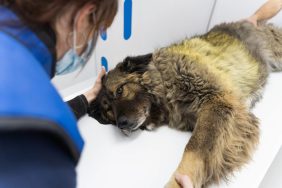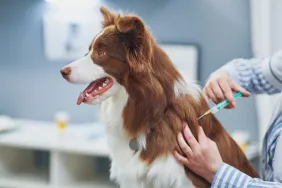Collie Eye Anomaly in Dogs: Symptoms, Causes, & Treatments

Collie eye anomaly in dogs is an inherited, congenital condition, meaning dogs have it from birth. It occurs because of a certain mutated chromosome, and in some cases, it can even result in detached retinas.
Collie eye anomaly is also sometimes referred to as “Collie eye defect.” As its name suggests, the issue usually affects the Collie dog breed, along with other sheepdogs.
If you see signs of this condition in your dog, then you should consult your veterinarian right away so they can treat it. Here’s what you should know about the symptoms, causes, and treatments of collie eye anomaly in dogs.
Symptoms of Collie eye anomaly in dogs
The bad news for dogs suffering from this eye anomaly is that it can be hard to detect until the dog actually begins to go blind.
@media (min-width: 0px) and (max-width: 749px) { .pb_prebidjs_300x250_a__wrapper { min-height: 250px; } } @media (min-width: 750px) { .pb_prebidjs_300x250_a__wrapper { display: none; } }
However, there are some changes that might affect the eyes that you can monitor and stay alert to if you adopt a dog who, because of their breed, is more likely to suffer from Collie eye anomaly. Some of these signs include:
- Eyeballs beginning to sink into their sockets
- Eyeballs seeming smaller than usual
- Cloudy eyes
If you adopt a puppy who might be susceptible to this, have your vet examine their eyes regularly starting at an early age.
Causes of Collie eye anomaly in dogs

Collie eye anomaly in dogs is caused when chromosome 37 becomes defective. The condition is also hereditary, so it’s found in dogs who have a parent carrying the genetically mutated chromosome.
The condition usually appears in the following breeds of dog:
- Border Collies
- Smooth Collies
- Rough Collies
- Shetland Sheepdogs
- Australian Shepherds
Treatments for Collie eye anomaly in dogs
If you bring your dog to the vet because you suspect that they might have Collie eye anomaly, the vet will usually perform a very thorough eye examination. Your vet will also want to look over your dog’s complete medical history and, if you have it, their breeding history.
Unfortunately, once this condition has taken root, it cannot be reversed. In extreme cases, such as a dog suffering from retinal detachment, vets may use a surgical procedure to help lessen the effects of the condition.
In better news, not every dog who develops the condition ends up showing signs of blindness. But if your dog does begin to suffer vision loss, talk to your vet about making day-to-day changes to your living environment so your dog will find it easier to move around and carry out their daily activities.




